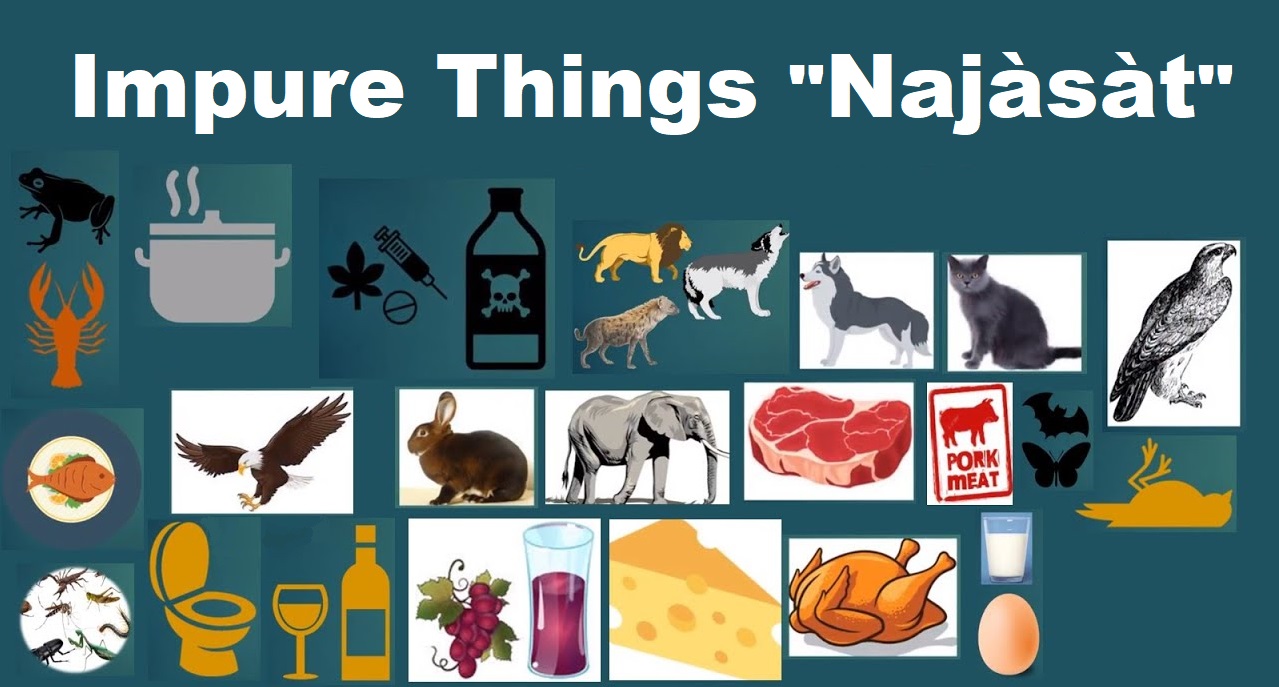The following ten things are essentially Najis:
· Urine · Feces · Semen · Dead body · Blood · Dog · Pig · Kàfir · Wine
· The sweat of an animal who persistently eats Najàsah.
Urine and Feces
Urine and faeces of the following living beings are Najis:
· Human beings · Animals whose meat is Halal (allowed) to eat, and whose blood gushes out forcefully when its large vein (jugular) is slit.
The excretion of those animals who are Halal (allowed) to eat, but their blood does not gush forth forcefully when killed, like Halal (allowed) fish, is Tahir. Similarly, droppings of such small animals as mosquito and flies whose meat is scarce are Tahir.
Of course, the urine of an animal whose meat is Halal (allowed) and its blood does not gush forth when killed, should be avoided as per obligatory precaution.
The urine and droppings of those birds which are Halal (allowed) to eat, is Tahir, but it is better to avoid them.
Semen
The semen of human beings, and of every animal whose blood gushes when its large vein (jugular) is cut and its meat is Halal (allowed), and as per obligatory precaution even those whose meat is Halal (allowed), is Najis.
Dead Body
The dead body of a human being is Najis. Similarly the dead body of any animal whose blood gushes forth with force is Najis, irrespective of whether it dies a natural death or is killed in a manner other than that prescribed by Islam. As the blood of a fish does not gush forth, its dead body is Tahir, even if it dies in water.
Those parts of a dead body, which do not contain life, like wool, hair, teeth, nails, bones and horns, are Tahir. If flesh, or any other part which contains life, is cut off from the body of a living human being, or a living animal whose blood gushes forth, it will be Najis.
Small pieces of skin which peel off easily from the lips, or other parts of the body, are Tahir, providing they do not contain life.
The liquid medicines, perfumes, ghee, soap and wax polish which are imported, are Tahir, if one is not sure of their being Najis.
Fat, meat or hide or an animal, about which there is a probability that it may have been slaughtered according to the Islamic law, are Tahir. However, if these things are obtained from a non-Muslim, or from a Muslim who himself obtained them from a non-Muslim, without investigating whether the animal was slaughtered according to Islamic law, it is Halal (allowed) to eat that meat and fat, but prayer in that hide will be permissible. But, if these things are obtained from Muslim market, or a Muslim, and it is not known that he got them from a non-Muslim, or if it is known that he got from a non-Muslim but there is a great probability that he has investigated about it being slaughtered according to Shariah, then eating such meat and fat is permissible, provided that the Muslim has done an act on it, which is done only when the meat isHalal (allowed), like when he is selling it for eating.
Source:
A Brief of Islamic Law
The Grand Ayatollah Al-Sistani
[Vol. 1, p. 8-10].

